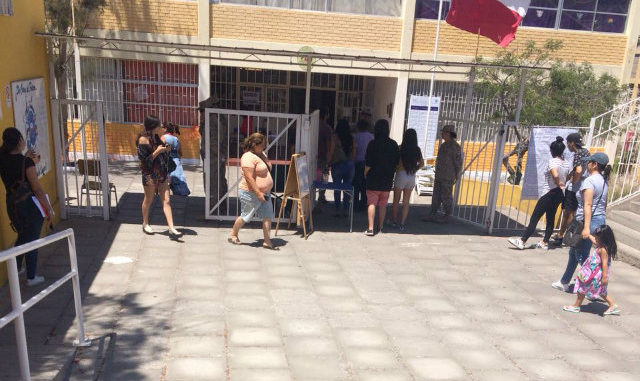
Isabel Cocker/The Santiago Times Staff
SANTIAGO – There were queues hours long at voting booths, I heard on Sunday. Many more people than expected had turned out to vote, and the polling stations weren’t ready for the influx of expectant citizens. It was a whisper I heard in the parks, two old ladies chattering in the shade. I also saw it on Twitter – the modern-day incarnation of these gossip benches.
Like many rumors though, this one turned out to be unfounded. There may have been queues at polling stations, but it was for some other reason than for high participation. Or perhaps the government had thought that turnout would be even lower than the 46.7% it ended up being.
ANALYSIS: What can we expect from the second round of the elections in Chile?
For the 2013 General Election, the Piñera government passed a law that removed compulsory voting for the population, and the participation rate appeared to drop like a stone, from 87% in 2009 down to 49.1% in 2013. Now, it has fallen even lower, below the forecasted 48% by CADEM. What has changed so dramatically in the past 8 years?
Nothing. Although the figures appear to show a dramatic loss of interest by the population in their ability to vote, this is only due to one of the requisites of the 2012 law which, in addition to making voting voluntary, made enrollment in the voter registers automatic. Previous to 2012, enrollment was the responsibility of the citizen – which meant anyone who didn’t want to be forced to vote, simply didn’t enroll. When automatic registration was opened, an additional 5 million people were added to the electoral roll.
In reality, figures have decreased slightly but much less than government-published statistics would have people believed. In 2009, 7,207,278 people voted in the first round of the Presidential elections. This past Sunday, 6,699,627 citizens showed up at the ballot boxes, a reduction of just over half a million people – noticeable, yes, but relatively not too significant.
When the Piñera government abolished compulsory voting in 2012, they did it with the expectation that automatic registration would encourage more of the citizens to participate. They believed that voting had to be a choice, and that forcing the population to take part in civic life was one of the main reasons for their reluctance to do so. They saw the compulsory voting system as akin to some of the systems of the Pinochet dictatorship, in which the lives of the citizens were controlled by the government. Unfortunately, this seems not to have been the boost the country needed.
With automatic registration, Chile would be able to ensure the participation of all of its citizens in the next election of 2021.
Schools should be doing more to encourage young people’s interest in systems of government and the rights of citizens. In a recent international study, it was found that Chilean secondary school students were more likely to turn to illegal methods of expressing their opinions of the government (54%) than they were to use institutional methods such as voting (52%). In the same study, Chile was placed 17th out of 21 countries in a test scoring the civic knowledge of 13 and 14-year olds.
However, it is not just the fault of schools and the lack of academic learning. Children are influenced by their parents, relatives and friends when it comes to forming basic opinions. With the quantity of adults who are disenchanted by the government growing, it is no wonder that their children are also growing up wary of the establishment. People are not seeing evidence of how their opinion in the country will make any difference in how it is run, or how this would impact their lives.

Of course, voting apathy and its consequences are circular. In Chile, it is usually the middle- and lower- classes who are less likely to vote, so governments are chosen by the rich who wish to improve the country for their own ends. Because of this, candidates have generally run on policies which they know will appease the upper classes, to attract the maximum number of votes. This, in turn, serves to further disenchant the lower classes, and make them even less likely to turn out to vote. A CEP poll in 2016 found that almost 60% of Chileans do not identify with any of the political parties in the country.
Who will be Chile’s next President: Conservative Piñera or Socialist Guillier? (VIDEO)
Imagine if there was a referendum, for example Brexit, and the STAY vote gained just 46.7% of the vote. Would you expect the British government to ignore the majority and carry on with their participation in the European Union as normal? There would be protests, there would be angry letters to newspapers, but there would also be lawsuits and people forcing Parliament to act and change the situation.
Here in Chile, however, this 53.3% majority is silent. It seems like people have given up on believing in the ability of the government to make any sort of permanent or significant change. It is not that they are happy with the status quo – more that they don’t think challenging the government’s authority through a ballot slip will lead them to greater salaries, better job opportunities or a better livelihood. With corruption and nepotism rife, it seems like politics is an “old man’s club” which is self-interested and doesn’t wish to act for the people.
This explains the rapid rise of Beatriz Sánchez’s Frente Amplio and the unexpected 20% of the vote she managed to capture on Sunday. The journalist-turned-politician has never held public office and seems to act as an antidote to a political environment still entrenched in the last century. Although she lost the presidency, her party won 20 deputy seats and gained a senator in Valparaíso. The youth and force of the party seems to be popular amongst the younger generations, who struggle to identify with the politicians they see sitting currently in Congress.
Nevertheless, even the popularity of Frente Amplio still did not manage to draw the citizens to the voting urns. With voter turnout on a downward trend, questions have been raised in parliament as to whether voting should be made obligatory once again, as it is in the majority of countries across the region. With automatic registration, Chile would be able to ensure the participation of all of its citizens in the next election of 2021. However, this would surely turn politics on its head. Would the political establishment be ready, or even willing, for the expression of decades of political mistrust that would stem from such a decision?



